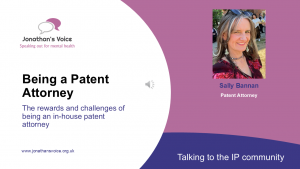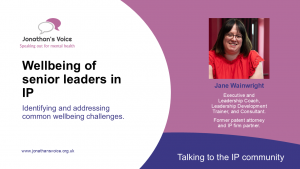This blog below was written by Laura Cassels who is the Informals’ Welfare Officer. The Informals is, as its name suggests, an association of the unqualified (or part-qualified) Student Members of the Chartered Institute of Patent Attorneys (CIPA). The blog first appeared in the Yellow Sheet (https://yellowsheet.wordpress.com/about-the-yellow-sheet/ ), the official blog of the Informals’ Committee.
“The term ‘crisis’ crops up in discussions around mental health. In particular, you may recognise the term ‘crisis’ in context of; ‘If you are in crisis, please call 999’
But what is a mental health crisis, and how do you know when you, or someone else, is in one? The term ‘mental health crisis’ is defined subjectively. It is used to identify a situation where an individual feels that they need urgent help or that they are ‘at breaking point’.
So, what constitutes a mental health ‘crisis’ is dependent on what the individual is experiencing, rather than relying on any objective measures or symptoms. Examples of a mental health crisis may include feeling extremely anxious, having extreme panic attacks or flashbacks, feeling suicidal, wanting to self-harm, or having an episode of mania, hypomania or psychosis, combined with the individual feeling that they need urgent help.
Planning for a mental health crisis
If you feel that you, or someone you know, may be at risk of experiencing a mental health crisis in the future, it may be useful to make a plan of where to get help in advance.This is helpful because it can be difficult to think clearly during a crisis.
It can also be helpful for people around you to know how to best support you if you are in a crisis. For this reason, some people also give a copy of their plan to supportive friends, family or colleagues. The plan doesn’t have to be detailed. For example, you could simply print the list of resources below and keep it in a safe space.
Some people also find it helpful to write a more detailed plan. This may include a list of:
1.What are the signs of a crisis for you?
This is very dependent on the individual. For example, for one individual suicidal thoughts may be the sign of a crisis, but a second person may already have strategies and support in place for this symptom. Instead, the second person may list their signs of a crisis as suicidal thoughts combined with other symptoms such as withdrawing from social activity.
2. Who do you want to contact if a crisis happens and how you would you contact them?
This can be family, friends, a helpline, community mental health team, A&E, NHS 111 etc. You may list their numbers, and/or plan for how to get to them. You may also want to list a plan A, B or C depending on how severe the crisis is. For example, you may start with calling a friend, but if they are not available and it is getting worse, you may call NHS 111.
Please note that if you list people who are not health professionals, such as friends or family, it may be helpful to write what they should do to help (i.e., should they take you to hospital, come to your house, encourage you to take medication etc.). It may be useful to also provide them with a copy of your crisis plan so that they know what to expect.”
Where can I get help if I am having a mental health crisis?
• If you believe that your life is at risk, please call 999 or go to your nearest A&E. This is free and open 24/7.
• You can make an emergency GP appointment by calling your nearest GP and explaining that you need urgent care. You do not need to be a registered patient and they should make a same day appointment for you.
• Call a local NHS urgent mental health helpline (England only). Find your local helpline here: https://www.nhs.uk/service-search/mental-health/find-an-urgent-mental-health-helpline
• Contact a crisis support helpline for free:
• Samaritans: call 116 123 or email jo@samaritans.org. Available 24/7.
• Shout: text 85258
• Papyrus: If you are under 35 call 0800 068 41 41, or email pat@papyrus-uk.org between 9am and midnight every day.
• National Suicide Prevention Helpline UK: call 0800 689 5652. Available 24/7.
• SANEline: you can call 0300 304 7000. Available 4.30pm–10.30pm every day.
• CALM: call 0800 58 58 58 between 5pm to midnight every day or chat to them online here: https://www.thecalmzone.net/help/get-help/
• If you’re under 25, you can call The Mix on 0808 808 4994 from 3pm to midnight every day, or request support by email using this form on The Mix website.
• If you identify as part of the LGBT+ community, then you can also access help from Switchboard by calling 0300 330 0630 between 10am and 10pm every day or emailing chris@switchboard.lgbt.
Thank you to Laura for allowing us to use this blog and to her and all those Informals who support the mental health and well-being of their colleagues.








